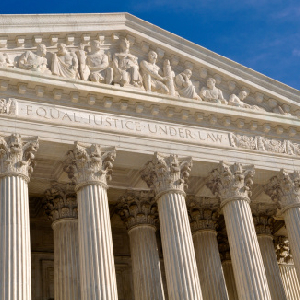Did SCOTUS Get One Right? Yes And No

THINKSTOCK
In a 5-4 decision, the U.S. Supreme Court ruled yesterday that local governments can open their meetings with a prayer even if the prayers routinely stress Christianity. The ruling overturned a New York Federal appeals court ruling that said the town of Greece, N.Y., violated the Constitution by opening nearly every meeting over an 11-year span with prayers that expressed Christianity.
The five justices who upheld the town’s practice reached the correct decision, but in their opinions, only one reached the correct decision for the correct reason: Justice Clarence Thomas.
Writing for the majority, Justice Anthony Kennedy noted that legislative prayer has become a part of U.S. heritage and tradition and that it began with the founding of the Nation. He noted that the country’s tradition “assumes that adult citizens, firm in their own beliefs, can tolerate and perhaps appreciate a ceremonial prayer delivered by a person of a different faith.
“As a practice that has long endured, legislative prayer has become part of our heritage and tradition, part of our expressive idiom, similar to the Pledge of Allegiance, inaugural prayer, or the recitation of ‘God save the United States and this honorable Court’ at the opening of this Court’s sessions. It is presumed that the reasonable observer is acquainted with this tradition and understands that its purposes are to lend gravity to public proceedings and to acknowledge the place religion holds in the lives of many private citizens, not to afford government an opportunity to proselytize or force truant constituents into the pews. That many appreciate these acknowledgments of the divine in our public institutions does not suggest that those who disagree are compelled to join the expression or approve its content,” Kennedy wrote.
That’s true so far as it goes.
In his concurring opinion, Justice Samuel Alito noted that when the first Continental Congress convened in September 1774, Samuel Adams sought to bridge the differences between the colonies and their interests by opening the session with a prayer. But the “motion was opposed on the ground that the delegates were ‘so divided in religious sentiments, some Episcopalians, some Quakers, some Anabaptists, some Presbyterians, and some Congregationalists, that [they] could not join in the same act of worship.’ In response, Samuel Adams proclaimed that ‘he was no bigot, and could hear a prayer from a gentleman of piety and virtue, who was at the same time a friend to his country.’ Putting aside his personal prejudices, he moved to invite a local Anglican minister, Jacob Duché, to lead the first prayer.
“The following morning, Duché appeared in full ‘pontificals’ and delivered both the Anglican prayers for the day and an extemporaneous prayer. For many of the delegates—members of religious groups that had come to America to escape persecution in Britain—listening to a distinctively Anglican prayer by a minister of the Church of England represented an act of notable ecumenism. But Duché’s prayer met with wide approval—John Adams wrote that it ‘filled the bosom of every man’ in attendance—and the practice was continued. This first congressional prayer was emphatically Christian, and it was neither an empty formality nor strictly nondenominational. But one of its purposes, and presumably one of its effects, was not to divide, but to unite.
“It is no wonder, then, that the practice of beginning congressional sessions with a prayer was continued after the Revolution ended and the new Constitution was adopted. One of the first actions taken by the new Congress when it convened in 1789 was to appoint chaplains for both Houses. The first Senate chaplain, an Episcopalian, was appointed on April 25, 1789, and the first House chaplain, a Presbyterian, was appointed on May 1,” Alito wrote.
Again, that’s all true as far as it goes.
But for his part, Thomas, with Justice Antonin Scalia concurring, got to the crux of the matter: The 1st Amendment provides that “Congress shall make no law respecting the establishment of religion.” The text of the Amendment and history, he wrote, “resis[t] incorporation against the States. If the Establishment Clause is not incorporated, then it has no application here, where only municipal action is at issue.”
In other words, Greece, N.Y. is not Congress, so Greece, N.Y.’s prayer is not a violation of the 1st Amendment. Later in his opinion, Thomas also noted that at least six States had established churches in 1789. So States that had established religions were likewise not “Congress” and, therefore, didn’t violate the “Establishment Clause.”
Applying the Clause against the States eliminates their right to establish a religion free from Federal interference, thereby “prohibit[ing] exactly what the Establishment Clause protected,” Thomas wrote.
So did the court rule correctly? Yes, but it’s troubling that only Thomas noted the actual wording – and, therefore, the actual meaning — of the 1st Amendment and how it applied. Even more troubling are the vapid dissents written by Justices Stephen Breyer and Elana Kagan.
Read the opinion.
More Evidence That Those Who Preach Tolerance Don’t Tolerate Preaching
Meanwhile, another “tolerant” progressive has reared her ugly head.
In Broward County, Fla., teacher Swornia Thomas told a fifth-grade student he was not allowed to read his Bible in class during “free reading” time.
The student asked the teacher to call his father. Thomas did, and left a voice mail message that said, “I noticed that he [Giovanni Rubeo] has a book—a religious book—in the classroom. He’s not permitted to read those books in my classroom.” In the intervening discussions, neither Thomas, school principal Orinthia Davis nor the Broward County School District’s legal department has yet to acknowledge that Giovanni has a right to read the Bible and that right is protected under the 1st Amendment.

No comments:
Post a Comment
Thanks for commenting. Your comments are needed for helping to improve the discussion.